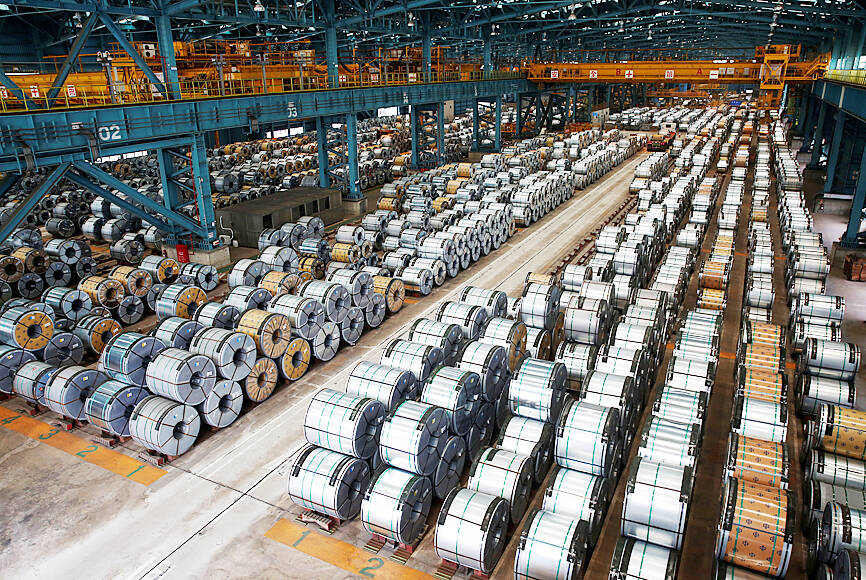China Steel Corp (中鋼) yesterday announced that it would keep domestic steel prices unchanged for deliveries next month to comply with changes in international markets and customer needs.
The decision to stay put following four consecutive months of price hikes came as the firm took customers’ inventory write-down expenses into account, the nation’s largest steelmaker said in a statement.
China Steel said that in the second quarter, it would only raise prices of steel plates used in vessels, and A36 and SS400 steel plates used in structural applications by NT$300 (US$9.5) per tonne, leaving the rest unchanged.

Photo: Tyrone Siu, Reuters
The firm reached the decision after considering several factors, including domestic downstream customers’ actual demand and order-taking schedule, and the steel market’s tepid recovery and confidence toward the economic outlook, it said.
China Steel expects steel demand to pick up after May and believes that potential US interest rate cuts starting from June would be a shot in the arm for the industry, it said.
“Cutting interest rates will promote investment, drive consumption and refresh the economy. It will be helpful for the real-estate market, and machinery equipment and vehicle sales, and it will also drive the demand for steel,” China Steel said.
The firm said the overall steel market remains stable in terms of supply-demand dynamics and is expected to show sequential improvement in the coming quarters.
On the other hand, global steel prices are expected to rise in the second quarter following consolidation in the first quarter, China Steel said.
Prices have shown signs of a turnaround, the firm said, citing announcements by US steelmakers Cleveland-Cliffs Inc and Nucor Corp on Thursday last week to raise hot-rolled steel prices by US$28 to US$44 per tonne, along with the 10th consecutive price increase next month for high-carbon hot-rolled steel coils by China’s Baowu Steel Group Ltd (寶武鋼鐵).
China Steel on Monday reported that consolidated revenue in the first two months of this year increased 5.91 percent year-on-year to NT$60.89 billion.
Shipments reached 1.93 million tonnes in the first two months, the company said, adding that it expects 2.7 million to 2.8 million tonnes of shipments in the first quarter and an even higher amount in the second quarter as the industry enters a peak season.

Taiwan’s rapidly aging population is fueling a sharp increase in homes occupied solely by elderly people, a trend that is reshaping the nation’s housing market and social fabric, real-estate brokers said yesterday. About 850,000 residences were occupied by elderly people in the first quarter, including 655,000 that housed only one resident, the Ministry of the Interior said. The figures have nearly doubled from a decade earlier, Great Home Realty Co (大家房屋) said, as people aged 65 and older now make up 20.8 percent of the population. “The so-called silver tsunami represents more than just a demographic shift — it could fundamentally redefine the

The US government on Wednesday sanctioned more than two dozen companies in China, Turkey and the United Arab Emirates, including offshoots of a US chip firm, accusing the businesses of providing illicit support to Iran’s military or proxies. The US Department of Commerce included two subsidiaries of US-based chip distributor Arrow Electronics Inc (艾睿電子) on its so-called entity list published on the federal register for facilitating purchases by Iran’s proxies of US tech. Arrow spokesman John Hourigan said that the subsidiaries have been operating in full compliance with US export control regulations and his company is discussing with the US Bureau of

Businesses across the global semiconductor supply chain are bracing themselves for disruptions from an escalating trade war, after China imposed curbs on rare earth mineral exports and the US responded with additional tariffs and restrictions on software sales to the Asian nation. China’s restrictions, the most targeted move yet to limit supplies of rare earth materials, represent the first major attempt by Beijing to exercise long-arm jurisdiction over foreign companies to target the semiconductor industry, threatening to stall the chips powering the artificial intelligence (AI) boom. They prompted US President Donald Trump on Friday to announce that he would impose an additional

China Airlines Ltd (CAL, 中華航空) said it expects peak season effects in the fourth quarter to continue to boost demand for passenger flights and cargo services, after reporting its second-highest-ever September sales on Monday. The carrier said it posted NT$15.88 billion (US$517 million) in consolidated sales last month, trailing only September last year’s NT$16.01 billion. Last month, CAL generated NT$8.77 billion from its passenger flights and NT$5.37 billion from cargo services, it said. In the first nine months of this year, the carrier posted NT$154.93 billion in cumulative sales, up 2.62 percent from a year earlier, marking the second-highest level for the January-September